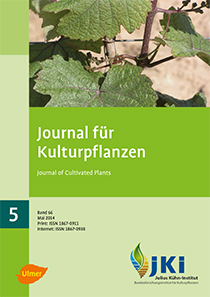<em>Candidatus</em> Liberibacter solanacearum – a new threat for potato and tomato production?
Keywords:
Bacterium, psyllids, pest risk analysis, Solanaceae, carrotsAbstract
The bacterium Candidatus Liberibacter solanacearum, originating in North America, can massively damage potatoes, tomatoes and bell peppers. Also damage on carrots has been observed. So far, the bacterium has not been detected in Solanaceae in Europe, however, in Finland, Spain and France it has been found on carrots. It is transmitted to potatoes by Bactericera cockerelli (Sulc) and probably also other psyllid species and probably also with planting material. Up to now, B. cockerelli is not present in Germany. In case the infested vector is introduced, establishment and spread of the bacterium are possible. If also other psyllids, that are already present in Germany or the EU, could act as vectors, there is an increased risk of the spread of the bacterium. There is some evidence that also the psyllids Trioza apicalis Förster and B. trigonica Hodkinson, both present in the EU, can transmit the pathogen, however, as far as known, only to carrots. The bacterium is not yet listed in the EU plant quarantine directive 2000/29/EC, but is, as well as its vector B. cockerelli, listed on the EPPO A1 List. A JKI pest risk analysis in particular for Germany and an EPPO pest risk analysis for the whole EPPO region are available. Due to its high damage potential, Ca. L. solanacearum presents an essential phytosanitary risk to Germany and other EU member states. In particular for the cultivation of potatoes in areas with very suitable conditions like the Mediterranean basin, high yield losses could be expected. The control of the vector is difficult (monitoring with yellow sticky traps, massive application of pesticides). According to the risk analysis, it can be assumed that the bacterium could establish in Germany or other EU member states and that it could cause important damage, in case its vector is also introduced or present. Therefore, measures according to § 4a of the German plant protection order should be taken to prevent the introduction of the bacterium as well as its vector. Symptoms in cultivation and production of host plants should be noted and verified. If infestation is suspected, it should be confirmed in the laboratory (plant protection service or JKI) and in case of positive findings notified to the JKI. Infested lots should be destroyed and vectors be controlled.
DOI: 10.5073/JfK.2014.05.02, https://doi.org/10.5073/JfK.2014.05.02
Downloads
Published
Issue
Section
License
The content of the journal is licensed under the Creative Commons Attribution 4.0 License. Any user is free to share and adapt (remix, transform, build upon) the content as long as the original publication is attributed (authors, title, year, journal, issue, pages).
The copyright of the published work remains with the authors. The authors grant the Journal of Cultivated Plants, the Julius Kühn-Institut and the OpenAgrar repository the non-exclusive right to distribute and exploit the work.







